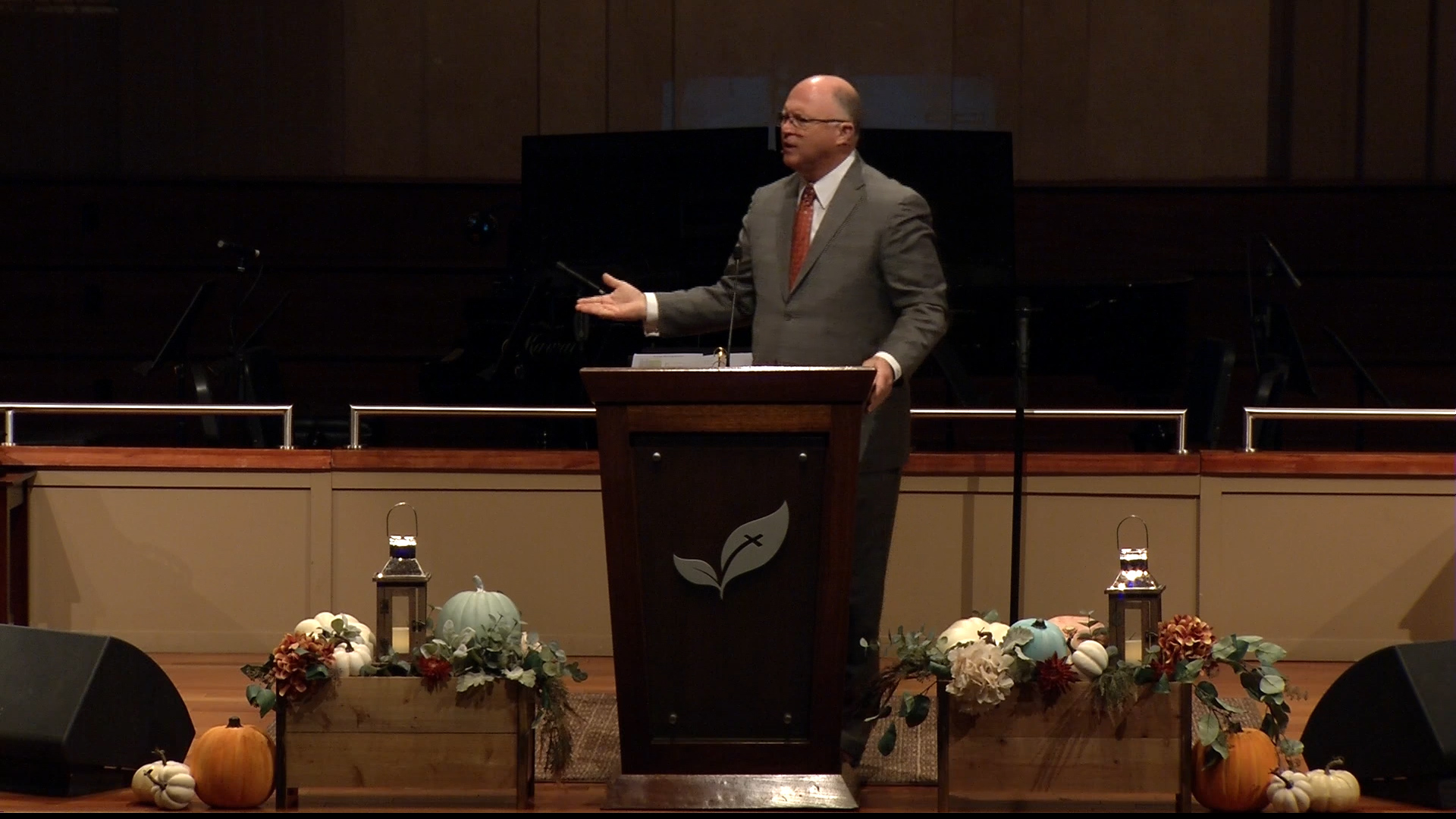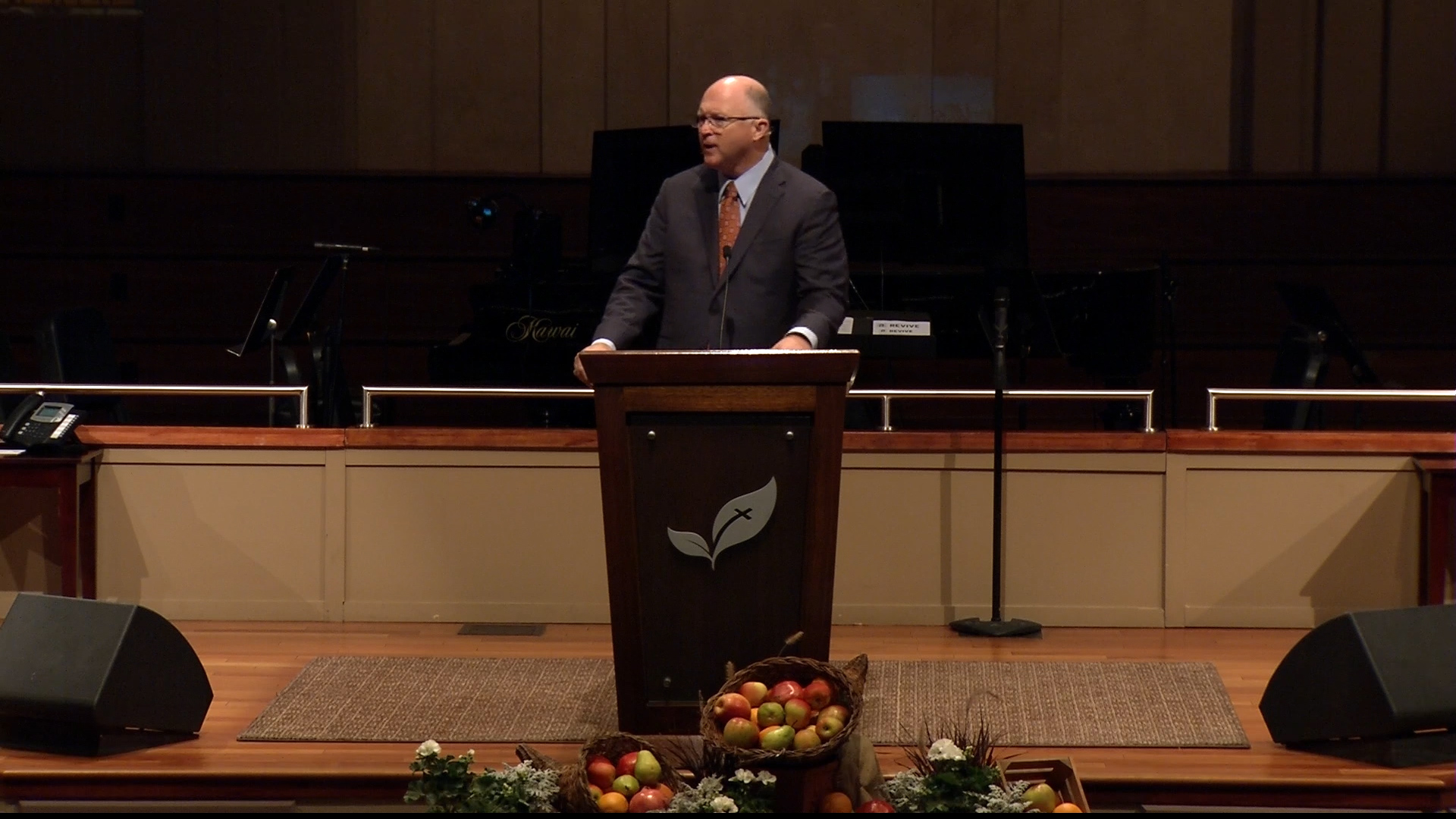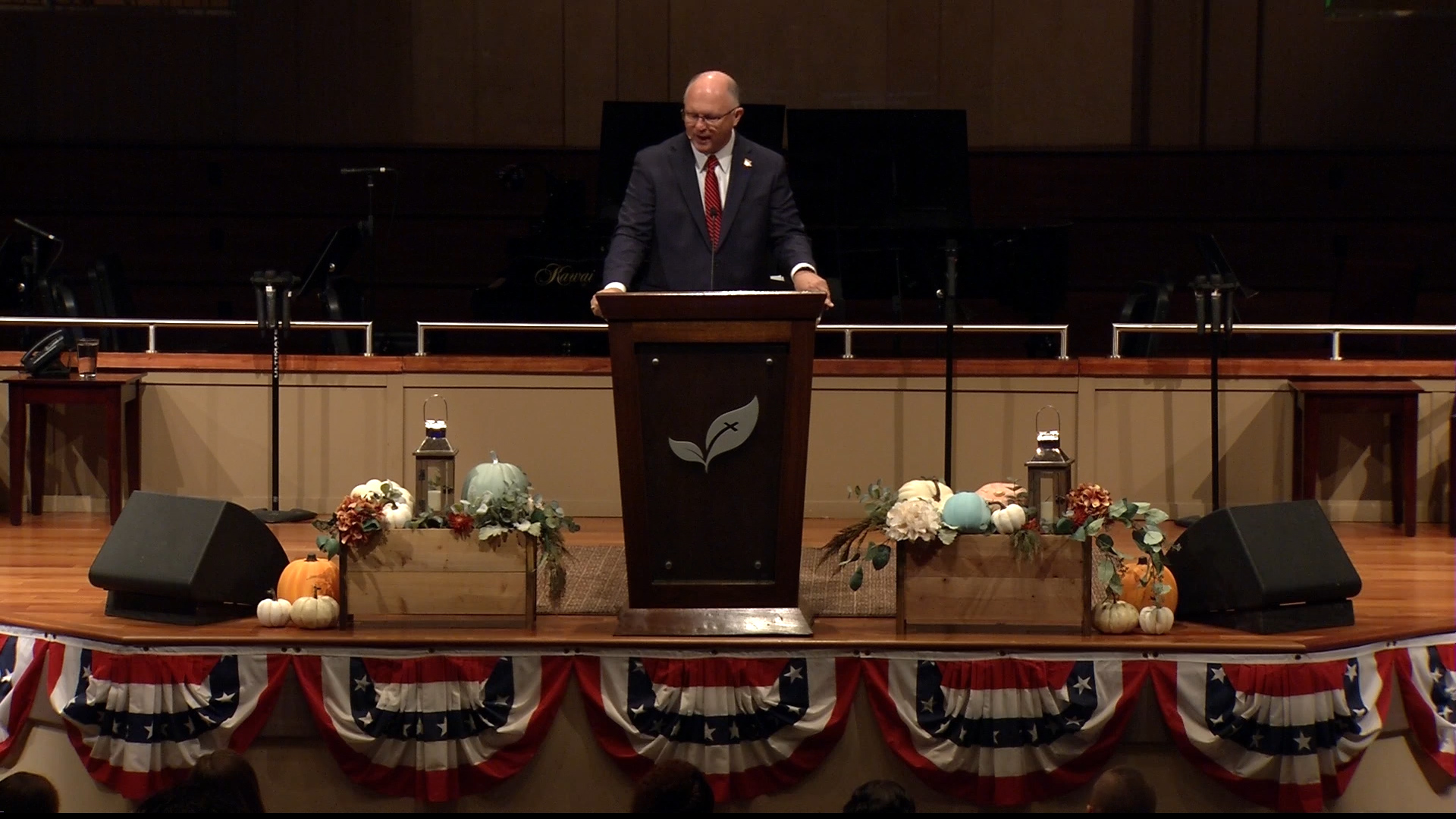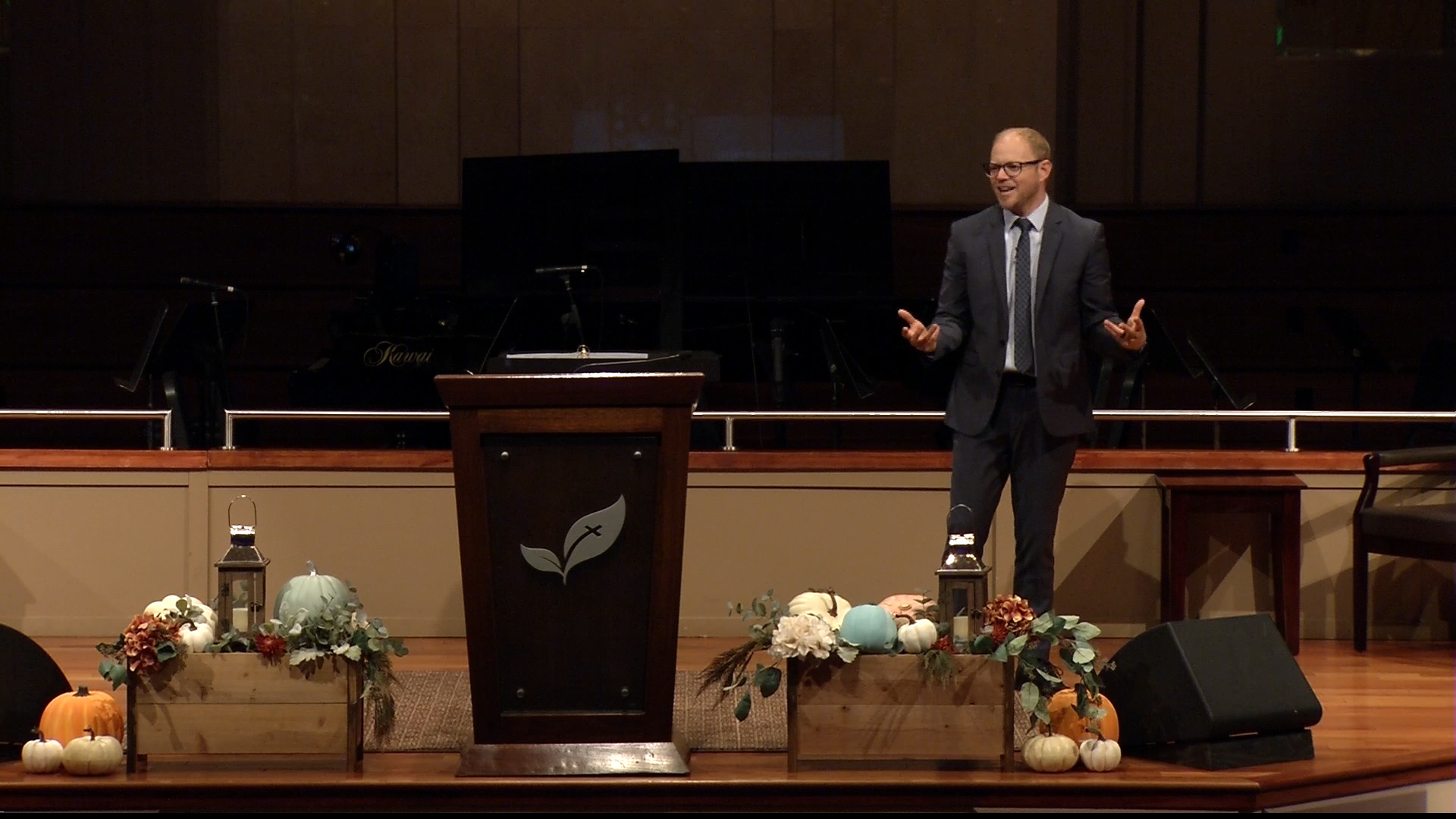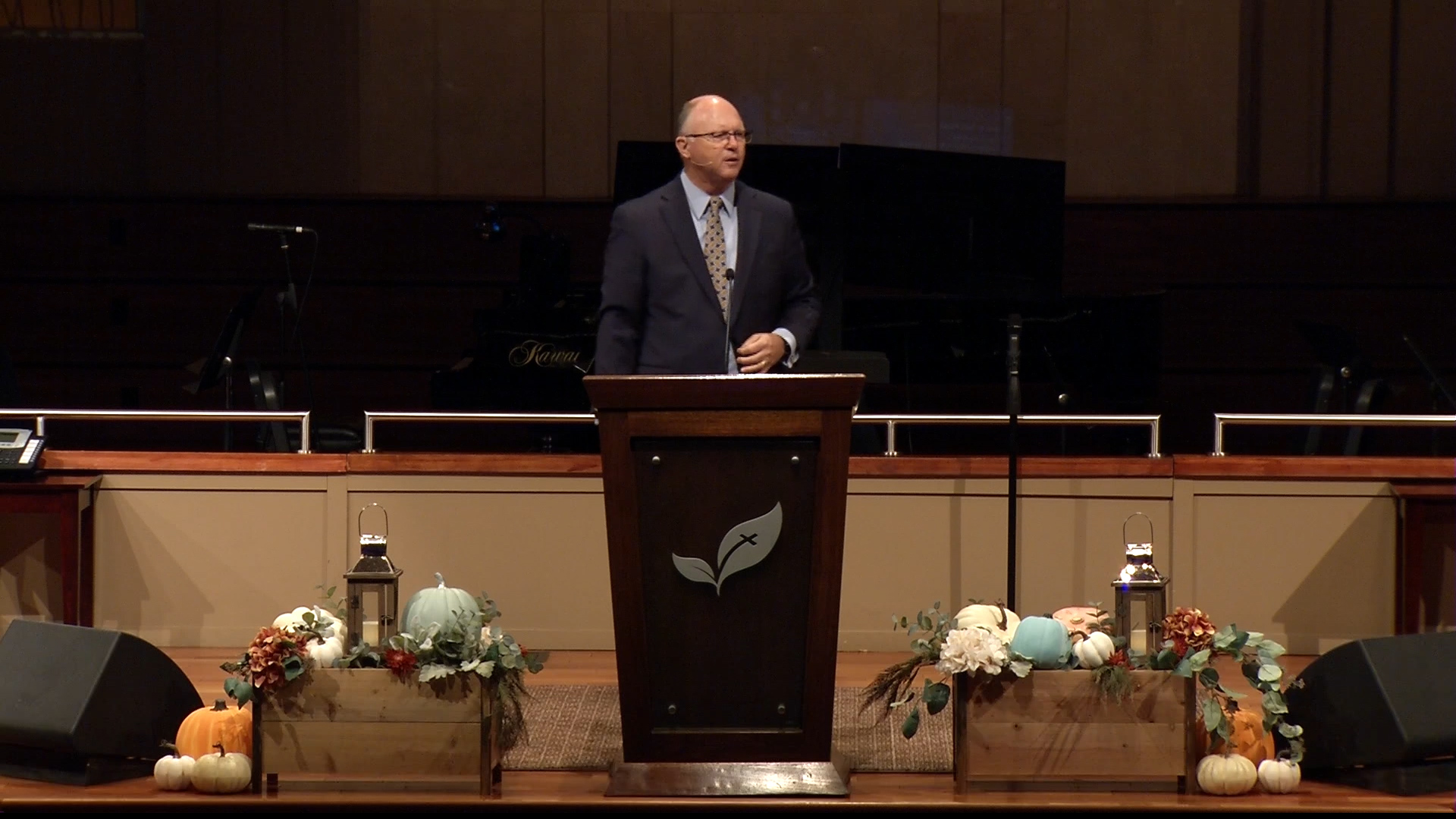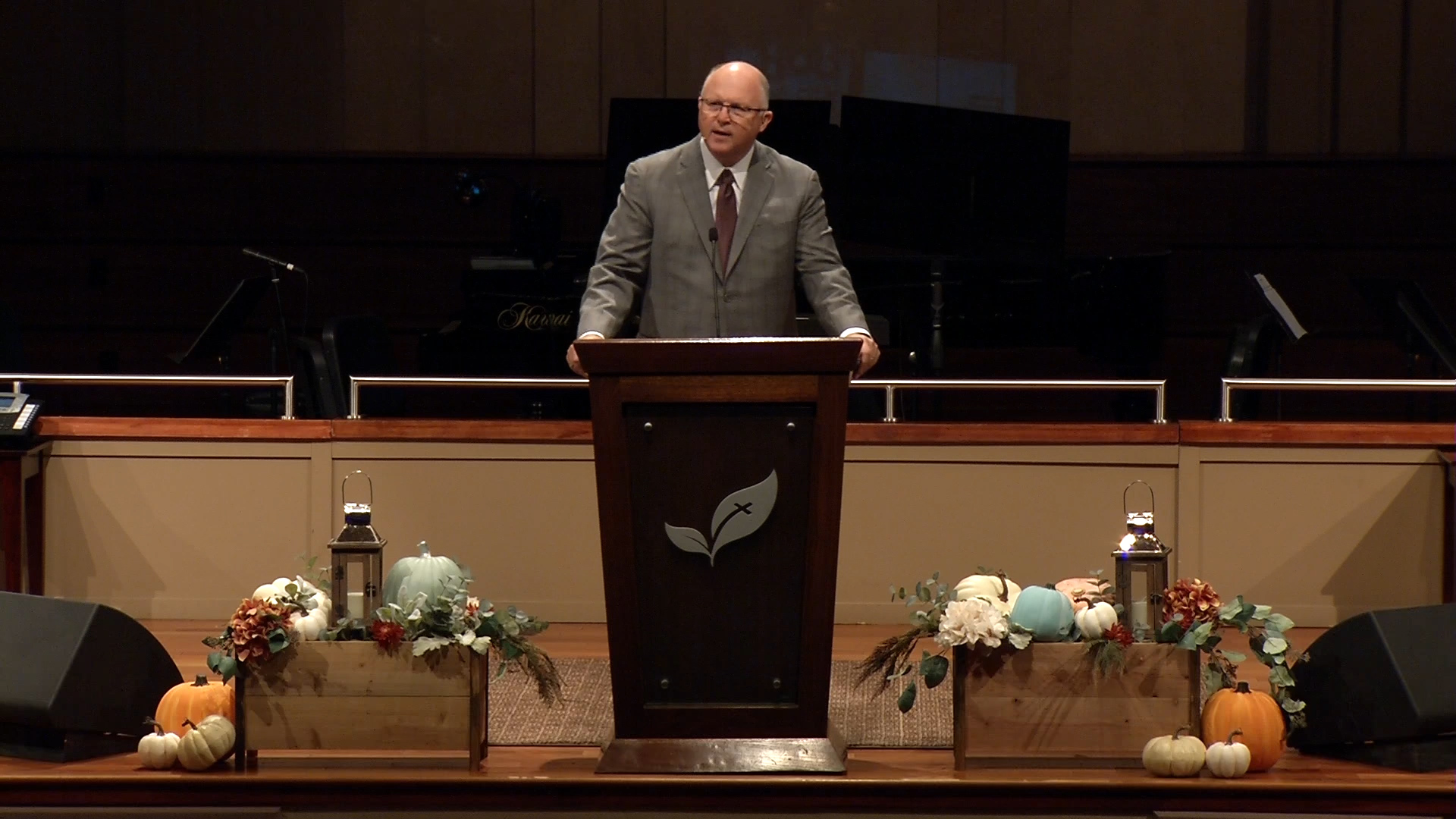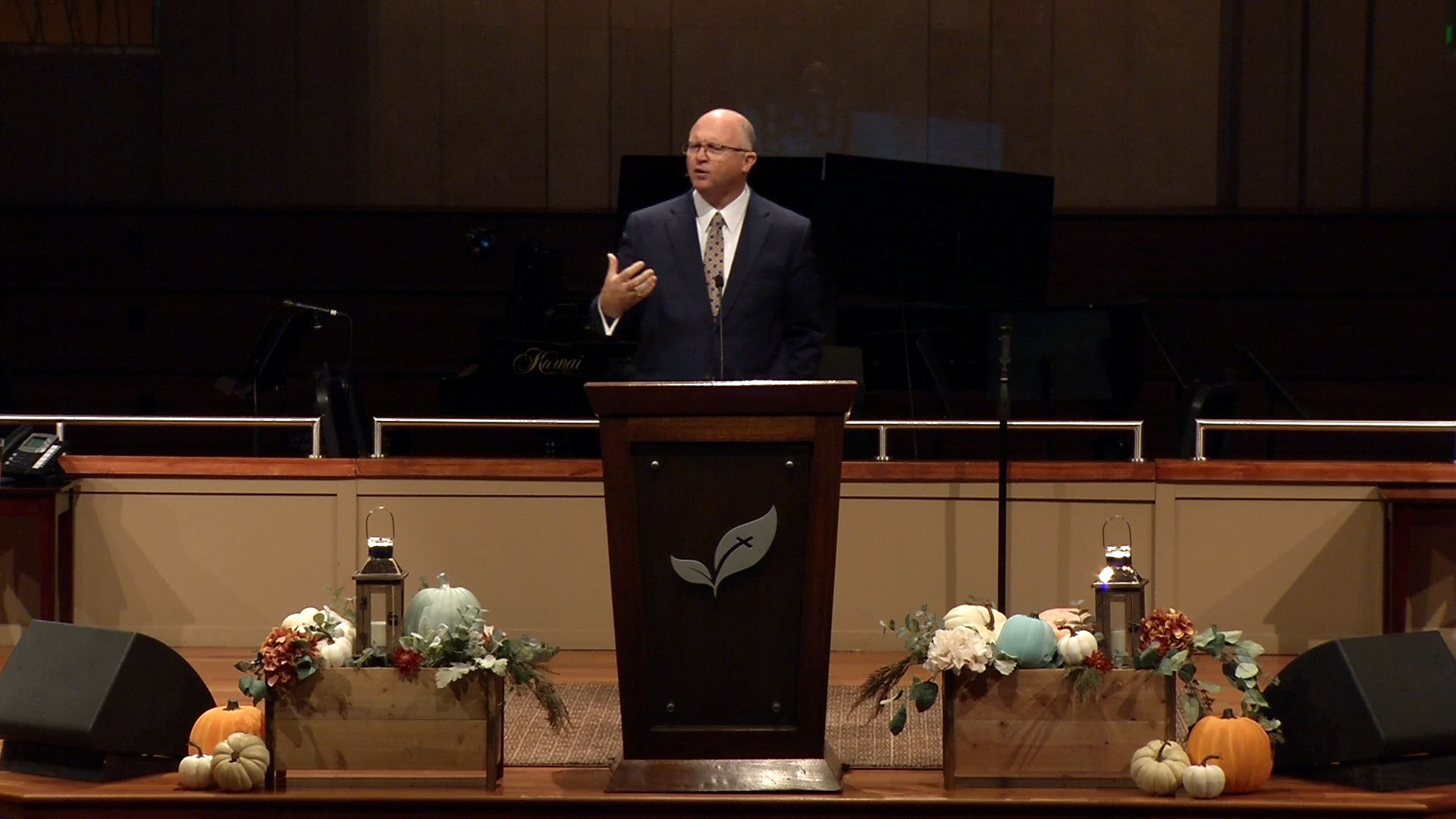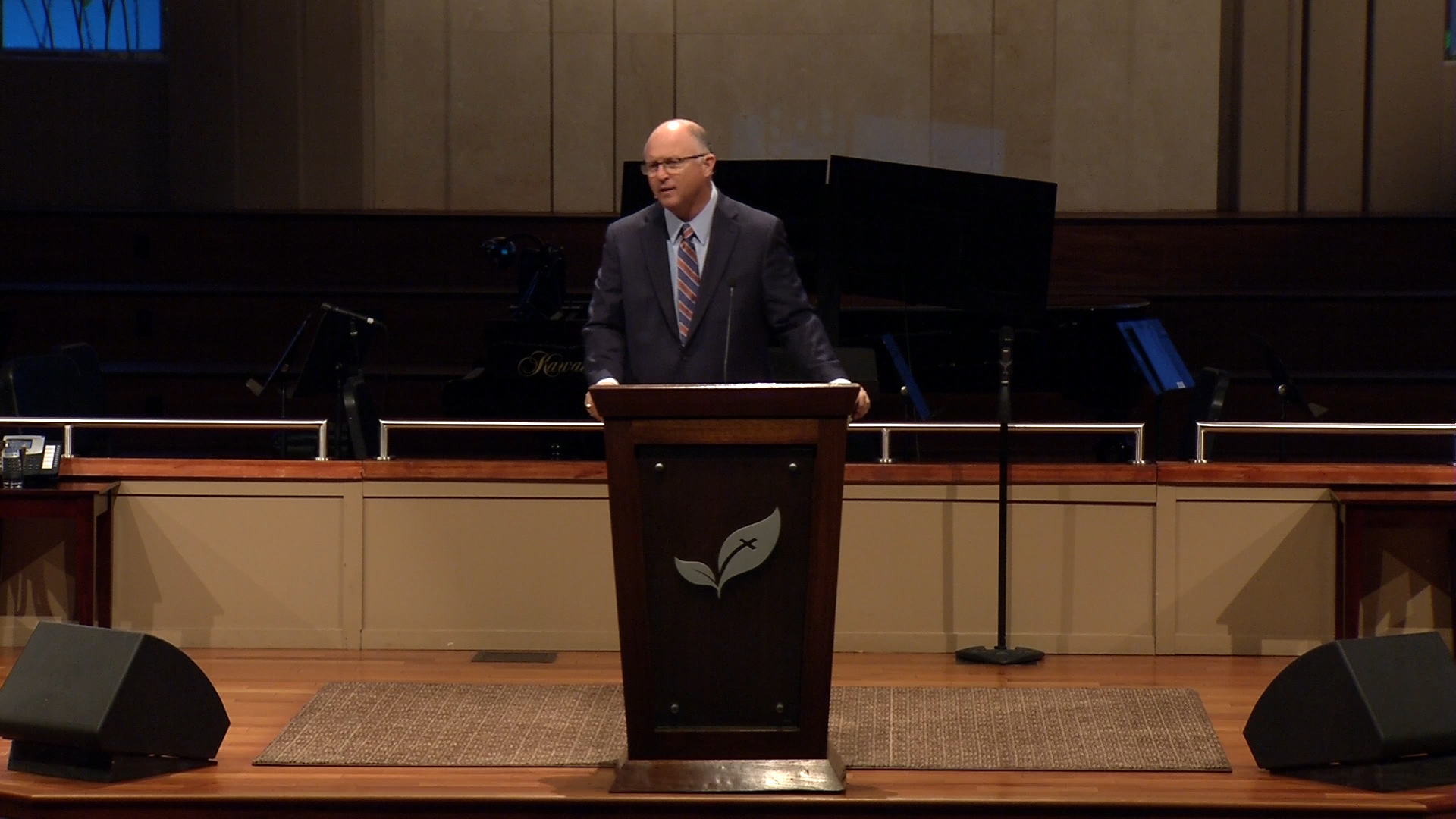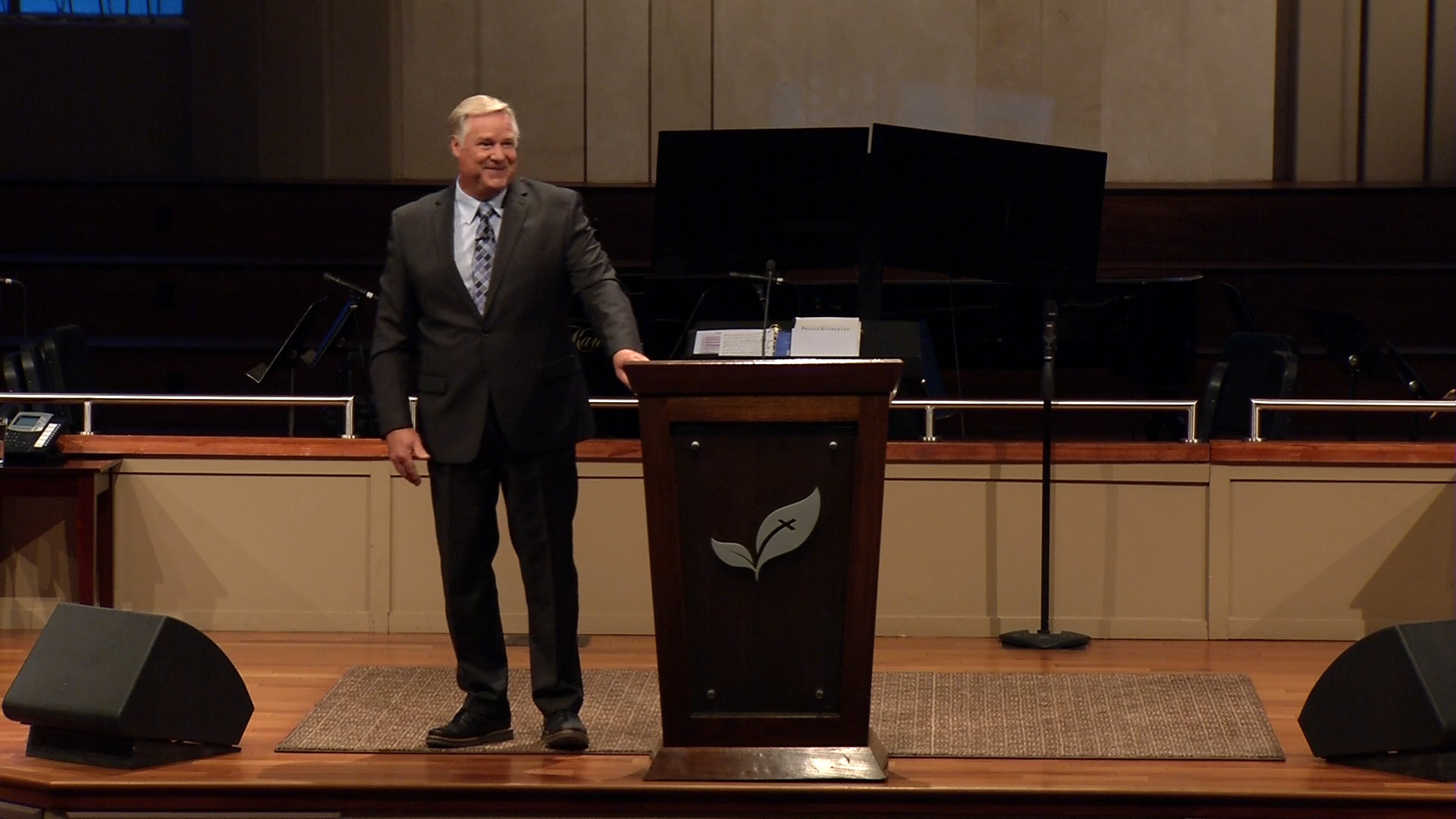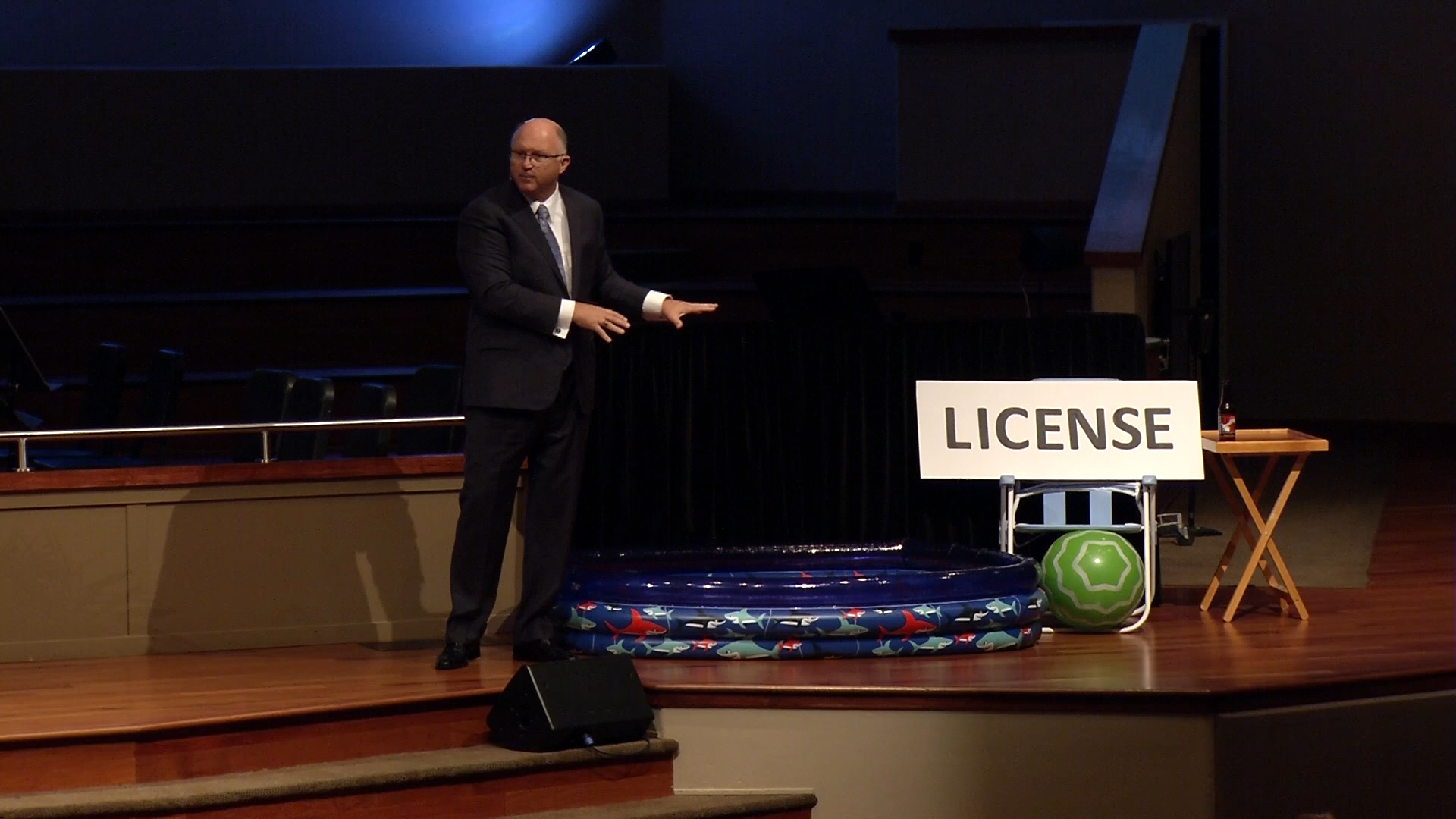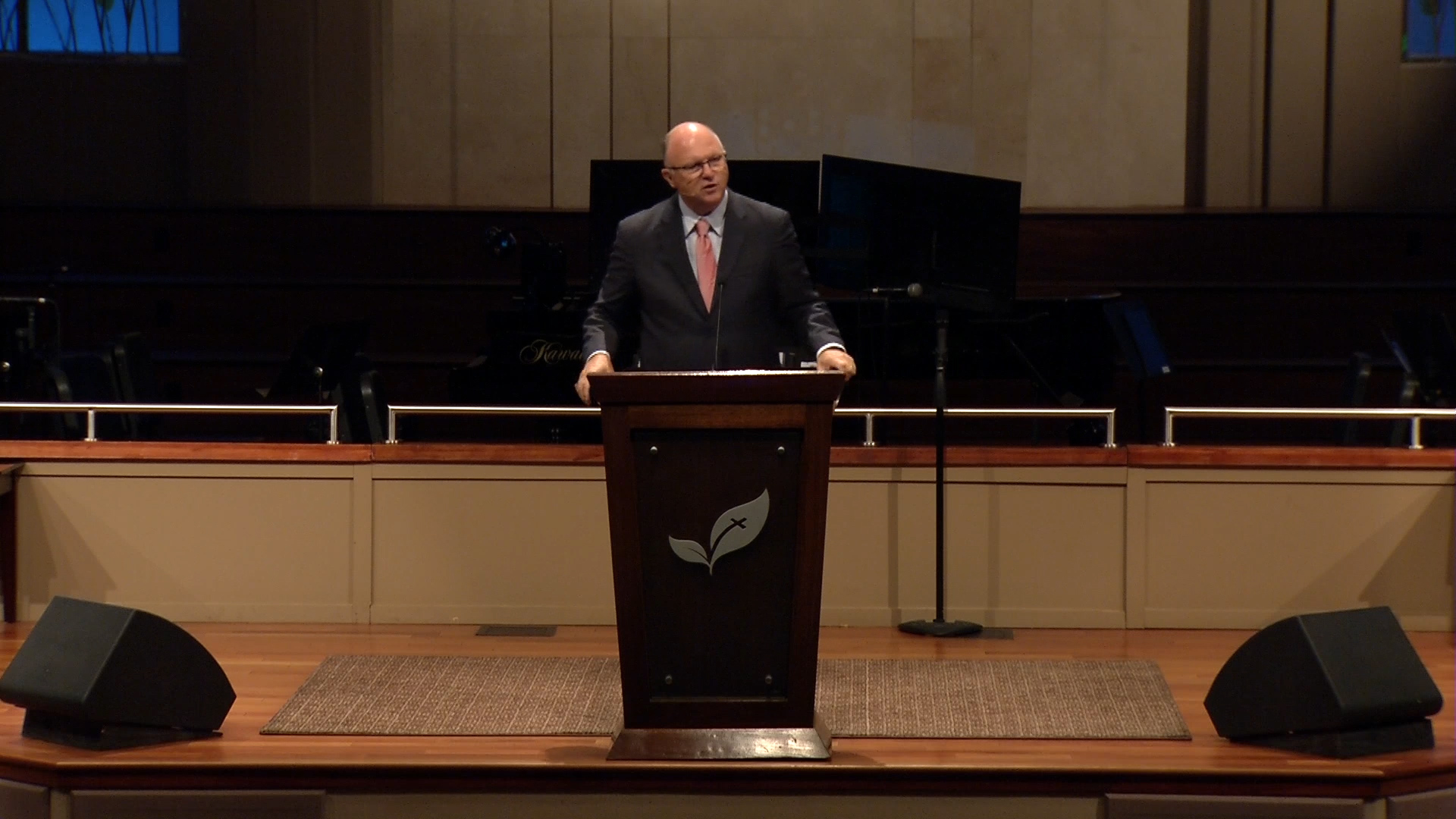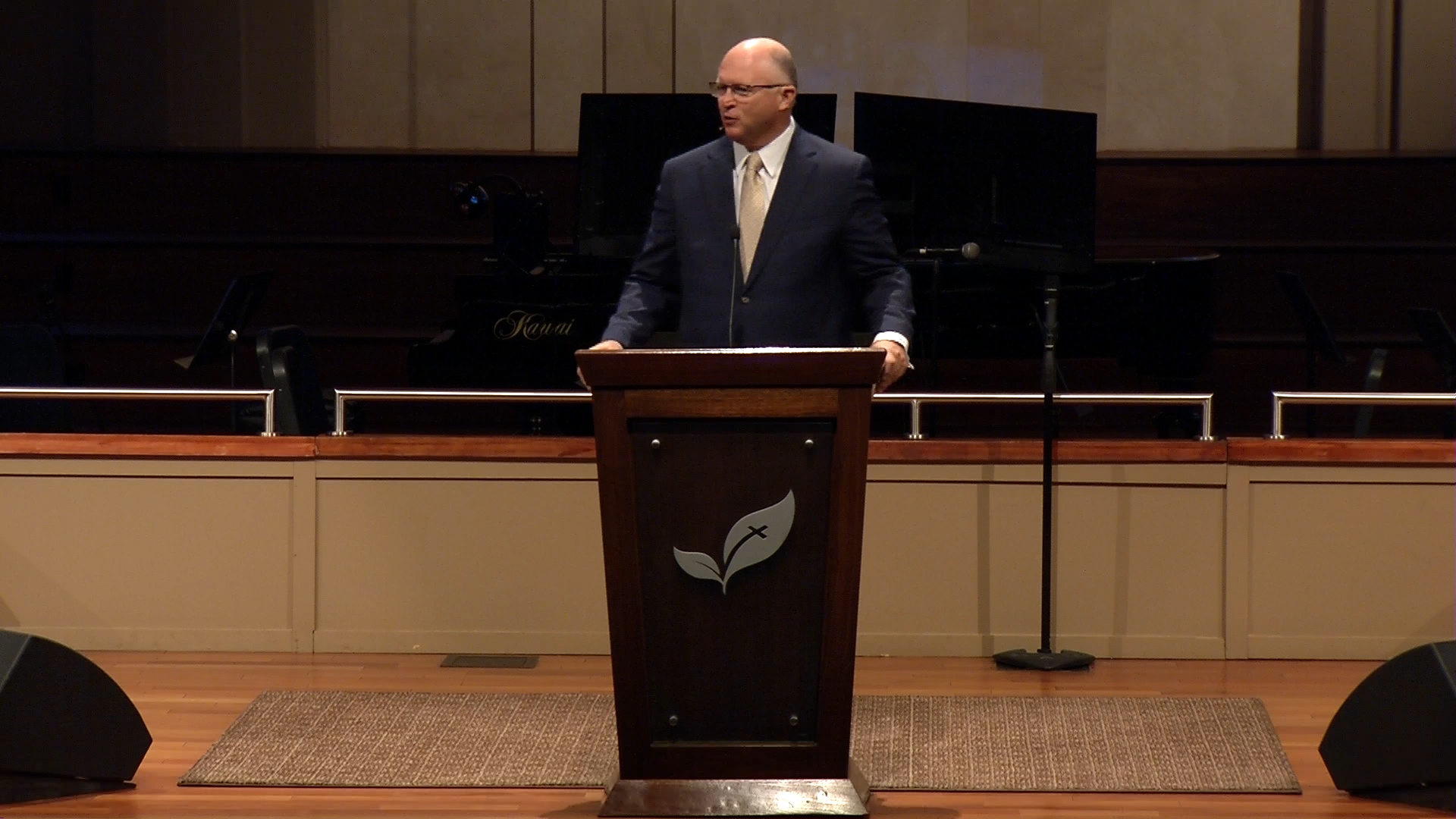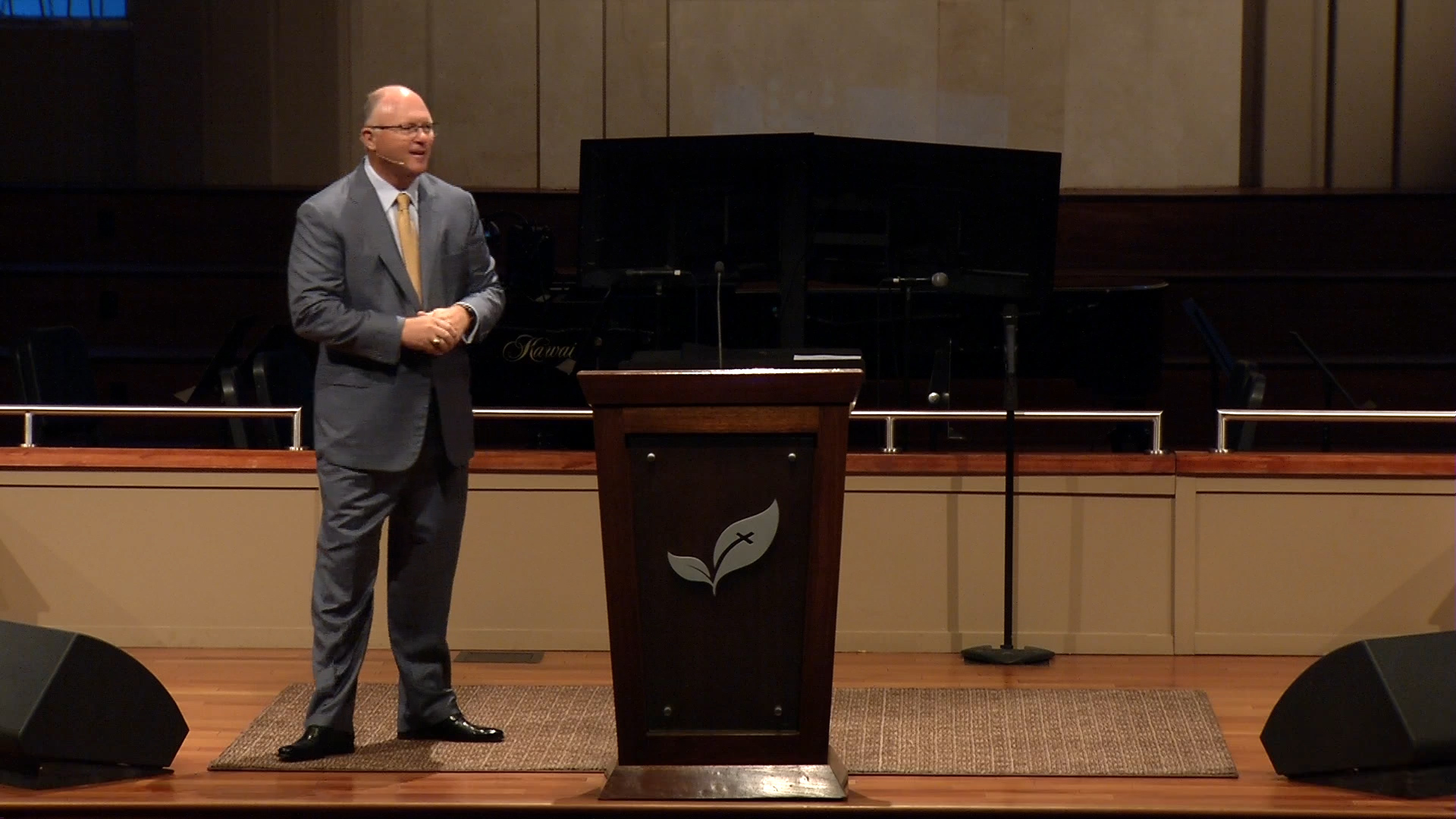Take your Bibles this morning and turn, if you would, please to Romans chapter 12, and let's stand together. We're beginning a brand new series today, and I'm very excited about this series. We're going to be preaching from all of the of the passages in the New Testament that speak about one another, and how we can relate and have a godly relationship with our Lord Jesus Christ first and foremost, with our families, within our church, and hopefully within other relationships, even in our workplaces. And so, the series is simply entitled: "One Another." And here's the great thing: since you're here on the very first Sunday of it, you're going to hear all twelve messages. And just be a part of it, bring a friend.
How many of you have a friend right now that you know in their marriage, in relationships within family, they are struggling? Let me see. How many of you know somebody like that? Invite them to come and learn what it really means to love one another, admonish one another, exhort one another, forgive one another; and how can we learn to build one another? So, Romans chapter 12. We're going to read beginning in verse 3, and we'll read through verse 10 for our Scripture reading.
"For I say, through the grace given unto me, to every man that is among you, not to think of himself more highly than he ought to think; but to think soberly, according as God hath dealt to every man the measure of faith. For as we have many members in one body, and all members have not the same office: so we, being many, are one body in Christ, and every one members one of another. Having then gifts differing according to the grace that is given to us, whether prophecy, let us prophesy according to the proportion of faith; or ministry, let us wait on our ministering: or he that teacheth, on teaching; or he that exhorteth, on exhortation: he that giveth, let him do it with simplicity; he that ruleth, with diligence; he that sheweth mercy, with cheerfulness. Let love be without dissimulation. Abhor that which is evil; cleave to that which is good. Be kindly affectioned one to another with brotherly love; in honour preferring one another." Let's pray together.
Father, we thank you for the Word of God today and how you speak to the issues pertaining to one another, togetherness, and the body of the local New Testament church. And so, this morning, I pray that as we begin this new series, that you would give us great insight, and that we would mature in our faith and in our connectedness one with another. May it bring glory to you is my prayer, in Jesus' name. Amen. You may be seated.
Well, as we begin this new series entitled "One Another," we're going to learn that Christians are connected. We are members one of another. And we are to exhort, we are to admonish, we are to encourage one another.
Now sadly, when you look across the spectrum at Christians in their relationships, oftentimes we see Christians that are more detrimental than they are helpful in their relationships. It seems as though even sometimes in Christian homes, and even sometimes amongst churches, you can see people who are not functioning one with another according to the teaching and the spiritual unity that we read about in the Bible. In fact, it's really sad, because it seems like sometimes we're better at dysfunctional destroying relationships than we are at edifying growing relationships. And so this morning as we begin this series we want to learn from God's word: How can we have the kind of body life in the church and in our families that will bring honor and glory to the Lord Jesus Christ?
I don't know about you, but sometimes it's easy just not even planning to be a discouragement to your family, to say or do something that sort of undermines what you're trying to accomplish for God's glory. I heard about a couple that was out shopping the other day, and somehow the husband and wife got separated from one another. And that's happened to me. You know, you're kind of looking at hardware and sports, and your wife is looking at cooking and this and that; and then suddenly you realize, "You know what; I don't know where my spouse is."
Now let me just ask: How many of you men have ever been maybe in a shopping mall, those of you that are married, and all of a sudden you realize, "I don't know where my wife is," and you became separated? Anybody else, or am I the only loser here? All right. That's happened to me a lot of times before, and you're like, "Where did she go?"
And this gal realized, "My husband's gone." She got on her cell phone, she called her husband, and she said, "Hey, we've got a lot of shopping to do. Where are you?" And her husband said, "Well," he said, "sweetheart, do you remember the jewelry store about ten years ago? We were in that jewelry store, you saw that beautiful necklace; and I couldn't afford it at the time, but I said to you, 'One day I'm going to get that necklace for you.'" And tears welled up in her eyes, and she thought about that store, and she said, "Yes, I do remember the shop." And he said, "Well, I'm in the gun shop right next door."
Now a lot of times that's kind of how it goes between guys and gals; we're just not real sharp at really edifying and encouraging one another. But God has called us to a higher, more distinctive relationship with one another and with the Lord himself than those, of course, who do not know God. It's God's will that the church would be a model for all that is related to functioning together and working together cross-generationally between baby boomers and millennials. If there's any organization that should show how to function well and work as a team it's the local New Testament church. It's God's plan for unity in message. It's God's plan for commitment to truth. And while we have diverse backgrounds, we have one blueprint with which we live and for which we live, and that, of course, is the Word of God.
So I want you to take this first message and begin to capture the spirit for where we're heading, and I want you to notice, first of all, in our notes this morning that there is a warning given to believers. And I want you to get this warning, because it's going to tell us that if we don't get this one area right, then we're going to mess up everything else.
So let's begin in verse 3; and notice it says, " For I say, through the grace given unto me, to every man that is among you, not to think of himself more highly than he ought to think." Now the warning to believers; and I want you to see it in verse 3, he says, "For I say." And, you know, there's always those that are kind of like, you know, looking and checking things out, and their spirit is kind of like, "Well, who is he to tell me, 'For I say'?" you know. "Who is he?" And I want you to recognize as we read the Bible and as we study this today that what we are studying is the very revelation of God.
In fact, Paul is very clear in his letters that it was God speaking through him. And the Bible has been given to us, these 66 books, from the prophets and from the apostles, and the Lord has given his truth to us. And notice, if you would in your notes, 1 Corinthians 14:37 says, "If any man think himself to be a prophet, or spiritual, let him acknowledge that the things I write unto you are the commandments of the Lord." In other words, Paul said, "What I'm about to tell you, this warning that I'm about to give you, is from the Lord." This is something that you need to hear.
And ladies and gentlemen, let us never forget, we're not here sharing our opinions or the latest author, Christian so-called author, we are here today preaching the very word of God; and we're here today to understand what the commandments of the Lord are all about, and what is the will of Jesus Christ. In fact, notice in verse 3 he says, "I say, through the grace given to me." In other words, the Holy Spirit working upon his life and giving us this warning. And when God wants to give you a warning, you don't say, "Says who?" When God wants to give you a warning you open your heart to it.
Now notice the warning, if you will, there. It's, first of all, a warning against faulty thinking, against faulty thinking. Notice that in verse 3: " For I say, through the grace given unto me, to every man that is among you, not to think of himself more highly than he ought to think."
Now pride ruins relationships, right? Only by pride cometh what? Contention. And pride creates within us an elevated perception of how great we think we are. And so often times relationships are hindered because of the way that we think.
Now someone today obviously, we might be sitting here going, "Yeah, a lot of people have that." Let me just set the record straight: we all have that. All of us can get to thinking that we know a little more than someone else. All of us can have that spirit of pride. It's a faulty thinking. It's something that wells up within us.
I remember years ago doing some marriage counseling, and a guy came in, and he had really offended his wife. And so, I was going to try to help them to learn how to repent and how to kind of seek restoration. I'm not being mean here; he was a very disheveled man. Everything about him was out of order: his appearance, his personal hygiene, his demeanor, the way he talked – the guy was a mess. And here I am trying to help this guy to realize how he needs to make things right with his wife.
And I'll never forget what happened. He kind of pulls up to my desk and he leans in towards me and he goes, "I'll tell you the problem, preacher; she just doesn't know what she's got in me." And I remember thinking to myself, "This guy has the spiritual gift of imagination."
There's something about us guys. I mean, we can have, you know, just a t-shirt on, full of grease, and greasy old pants, and we could have really nothing going for us, but we think we've got it all together, right? It's pride that we deal with so often. And the fact of the matter is that each of us must hear the warning today of faulty thinking.
I heard about a young man that got his first job at the supermarket. And he went there, and he was going to be a manager. And the senior manager said to him, "All right, welcome." He said, "Now I want you to take this broom and I want you to go over there and sweep that entire part of the store."
The young man looked at him and he said, "Wait a minute; you don't understand. I'm a college graduate." And the senior manager said, "Oh, okay; let me show you how this works."
You know, a lot of times we get into our mind what is below us, right, what we can or cannot do. Galatians 6:3 says, " For if a man think himself to be something, when he is nothing, he deceiveth himself." And so there's a faulty thinking. Spurgeon said, "Don't desire to be the principle man in the church; be lowly, be humble, be the best man – the best man in the church is man who is willing to be a doormat for all to wipe their boots on, the brother who does not mind what happens to him at all, so long as God is glorified." In other words, don't be an egohaulic. Don't be someone that's so filled with yourself.
There's a young man on the Lakers; his name is Lonzo Ball. And I don't know a name like Lonzo comes from, but that's his name. And his dad's name is LaVar Ball. If you've ever heard the sportscaster, if you've ever heard about this family, LaVar Ball is just a talker, and he just talks big all the time. And I heard about an article where he was being interviewed on one of the sports stations, and this LaVar Ball said, "Look," he said, "back in my heyday, if I would have played Michael Jordan I would have killed him." So I did a little research into his heyday. He played one year of college basketball, he averaged two points and two rebounds per game.
You see, that's the problem with some of us; the older we get, the better we were, right? You find someone, they read three books and they want to go tell someone who's read ten thousand, someone who's been saved three years wants to tell someone who's walked fifty years with the Lord how it all works. Really? Faulty thinking.
The Bible is very clear that we need to humble ourselves and remain teachable. You see, God wants us to have a spirit where we can take in the Word of God. It's like the pastor that was going to a college where he was going to receive an honorary degree; and he goes to the college, and the college president brings him up, and he says, "Today we have with us a very, very, very great man." And they proceeded to say some nice things; they gave him a beautiful degree. And on the way home that pastor put his arm around his wife and he said, "Sweetheart, how many very, very, very great men do you think are in this world?" She said, "One less than you think." Faulty thinking. Faulty thinking.
And then there's this problem with forgetful thinking. Look at verse 3 again. He says, " not to think of himself more highly than he ought to think; but to think soberly, according as God hath dealt to him, to every man the measure of faith." In other words, let's not forget that God is the source of our gifts. "God has dealt." That word means "to distribute" or "to bestow." God has dealt a measure of faith." That words means "a determined extent."
So it is God that has given us the ability to do the things that we do. So if there's anything good about us, it's all to the glory of God, you see. And we don't want to forget that when your business is blessed, that's not you, that's God blessing you. And when your children are blessed, that's God blessing you. And whatever it might be, that is God giving you and bestowing upon you his grace and his blessing.
And even the measure of faith, that is to say our heavenly Father does not burden us with gifts which he does not provide every spiritual resource we need to successfully express those particular gifts. And so, let's never forget that, "Every good and perfect gift cometh down from above from the Father of lights, with whom there is no variableness, neither shadow of turning." God is the giver of every wonderful gift.
So there's a warning; and that's where we're going to start this whole series, because whenever we get filled up with ourselves, "Well, I done this," or, "I've been there," or, "I know this," sooner or later the one another begins to strain and begins to tear.
Now let's notice, secondly, the wonder of the believers. God says, "I have a wonderful plan; it's beautiful. It's called the body of Christ, the local church." And God says, "It really should function in a particular way." And we see that in verse 4. The Bible says, " For as we have many members in one body, and all members have not the same office: so we, being many, are one body in Christ, and every one members one of another."
Now here we see the unity of the body. Even as our body is uniquely and wonderfully made, God has a plan for the local church, and his plan is that the church functions well. And let me tell you something this morning: God is not as interested in the size of this church as he is in the health of this church. You see, my main concern is not the breadth of this ministry, it is the depth of this ministry. It is the health of this ministry. It is that we are functioning properly.
So notice what he says in verse 4: "We have many members in one body." We see that there are many members. The word there is a Greek word melos. It means "a limb" or "a part of the body." There's lots of parts of the body.
By the way, sometimes people say, "Well, I come from a rougher background; I wasn't raised in a Christian home. I've got some issues," or whatever, "so therefore, I'm not as important as the other people in this church." Let me just say again: that is a lie from the devil. The Lord adds to the church such as should be added, and there is no unimportant part of the body. And if you don't believe that, go home, take off your shoes, get a hammer and bang your baby toe with that hammer, and you'll find your baby toe is a very important part of your body.
Everyone that is a member of Lancaster Baptist Church is an important part of this body. God is very clear that he adds to the body and that everyone has a particular function. Notice that in verse 4. It says, "And all members have not the same office." That means "function" or "business."
So then, Jesus is the head of the body, and that he is to be preeminent in all things in the body. But I want you to look in your notes there at 1 Corinthians 12:14, and I want you to see what it says. It says, "For the body is not one member, but many. If the foot shall say, 'Because I'm not the hand, I'm not of the body'; is it therefore not of the body? If the ear shall say, 'Because I'm not the eye, I am not of the body'; is it therefore not of the body? If the whole body were an eye, where were the hearing? If the whole were hearing, where were the smelling? But now hath God set the members every one of them in the body, as it hath pleased him." Now let's just pause there.
God has set the members as it hath pleased him. You say, "Well, you know, there's some people in our church that bug me. There's some people in my family that bug me." Wait a minute; he says, "I have set in the body who pleases me."
Now can I tell you something? The gospel light attracts a lot of strange bugs – some of you will get that tomorrow. And there might be someone that you don't function as well with, you don't understand; but God has put them here for a reason, right, that we might express grace, that we might learn to work together. It's he, according to that which has pleased him. And so, the Bible says in verse 20, "There are many members, yet one body."
Neil Armstrong years ago was talking about his famous moon walk; and as he talked about his walk on the moon he said in an interview these words. He says, "As I stepped on the moon I was aware that this was a culmination of the work of three hundred, maybe four hundred thousand people over a decade." And he and Jim Lovell were able to say that their favorite part of walking on the moon was knowing that they were a part of a great team effort.
And that's how the body works. While I'm preaching here this morning, there's a couple hundred ladies working in the nursery, and there's ushers that are helping, and there's folks that are doing their part, and singers that are singing; and all of us are working together. Why? So that the gospel could be advanced. And when churches do not function according to the Word of God, and there is disunity, then I'll tell you what'll happen: America will go to hell in a handbasket because churches are not functioning the way they should function. The devil doesn't want the church to function.
God is saying, "I have a design, and I want you to follow that design." The uniqueness of every member then is seen. The uniqueness of every member. But notice, secondly, the unity of the whole body. There's to be unity in the whole body, verse 5: " we, being many, are one body in Christ, and every one members one of another."
You see, our relationship in the body: we are all individuals, and God says, "By this shall all men that ye are my disciples, if ye have love one to another." God says, "The world should look at the church and they should see the love in the church, they should see the way the church functions, and they should recognize by our love; there's something different there." This isn't Lockheed. This isn't the police station. This isn't the hospital. This isn't Northrop. This is the church of the living God, and the unity of function and the love of function should be a testimony to the presence of God.
So our relationship in the body, we're individuals, but we all have a responsibility to this body. Look what it says in Ephesians 4:3, "endeavouring to keep the unity of the Spirit in the bond of peace, endeavouring to keep the unity of the Spirit in the bond of peace." We're going to learn how to do that in our homes. How do you have unity in a home? How do you have unity in a church? God says, "I want you to make that your mission. I want you to go and make things right when there's Matthew 18 needs to be practiced. I want you to dwell together in unity."
Internationally-renowned surgeon by the name of Dr. Paul Brand once wrote about the body, comparing it to the body of Christ. And Dr. Brand said, "The body of Christ, like our own bodies, is composed of individual unlike cells that are knit together to form one body. The joy of the body increases as individual cells realize they can be diverse without becoming isolated outposts. There are also," he said, "rebellious cells in the body of Christ. Some of benign in that they do not destroy the church, they simply gorge themselves on blessings and benefits at the expense of the rest of the body. They become fatter and fatter, always taking, seldom giving. The church also has cells that are mutinous to the point of destruction. These malignant members hurt the rest of the body."
And I can tell you that the one word I hate to hear whenever I get phone calls from members of our church and they're going to tell me something about their life, the one word I hate to hear is the word "cancer." There's something about that word. It brings a grip to me like a fear; and I try to come back and faith. I hate that word. Every day this week I talk to someone in our church who's dealing with malignancy.
But sometimes into a spiritual body there can come malignant cells. The devil had been working there, and there's questioning, questioning, floundering, floundering, bringing into the church that which God did not design, not deferring to the Word of God or even the under-shepherd, but just saying, "I read this on Vimeo," or, "I saw this on Facebook, and that's just the way it's going to be." And soon, instead of unity, there's disunity, because instead of following the Word of God and an under-shepherd, we seek many shepherds in Washington, Florida, Australia, because we want to find somebody that fits what we want to hear.
But God says, "That's not going to help the body." If your body's going to function, you're going to stay in the Word of God and in unity with the body; otherwise, malignancy cancer will come, and sickness will come. And we see that happen often. You see, every member here has the potential to hurt or help. Every member here has the potential to be a blessing or a burden. And God wants everyone of us working together so that the gospel can be sent to a lost and dying world.
Years ago after World War II there was a church in England that had been bombed. It was a tragedy, and many scenes like this unfolded. In fact, there are some places, like in Munich, Germany, where entire churches that are bombed out have just been left so that the generations to come could see the ravages of war.
Well, there were a group of German teenagers that came to England, and not far from Southampton where this church was located, to repair this church. And as the work progressed, they were doing their best. But there was this one statue; it was a large statue of Jesus, and under the statue were the words, "Come unto me." And they worked and worked on this statue, but they had particular difficulty repairing the hands of the statue. And finally after they could no longer find a way to repair the hands, they simply placed a sign at the bottom of the statue that said this: "Christ has no hands but ours." And do you realize today that this church is to be the hands of Jesus? See, it doesn't matter what your opinion is if you're not serving in the body.
Yesterday, 77 widows were visited by members of this church. Hundreds of fatherless children were visited by members of this church, being the hands of Christ, being the voice of Christ. And when there is disunity the voice begins to blur, and there's so many mixed messages, that the message isn't getting out the way that it should. You see, the wonder of believers is the fact that we're a part of a body; and when we can sing to the Lord in doctrinal unity, then the message is heard by a lost and dying world. There's no question what we're trying to say, the message is clear. The warning to believers: watch out for pride. The wonder of believers, that when we sing together we can make a great message known for Jesus.
But notice, finally, the work of the believers. What is the work of the believers? Verse 6 says, " Having then gifts differing according to the grace that is given to us, whether prophecy, let us prophesy according to the proportion of faith; or ministry, let us wait on our ministering: or he that teacheth, on teaching; or he that exhorteth, on exhortation: he that giveth, let him do it with all simplicity; he that ruleth, with diligence; he that sheweth mercy, with cheerfulness."
Now every one of us are given gifts not for ourselves, but so that we might encourage one another and help one another. And I want to take a quick side minute and just speak about spiritual gifts, and then I'll tell you about some of those specific gifts, because we sometimes hear about gifts and spiritual gifts. So let me say there are two categories in the Bible.
First of all, there are what we call temporary sign gifts. The gifts that were temporary sign gifts were given while the Bible was still being written. They were given to enhance the apostolic era and the message, so that unbelieving Jews, for example, who questioned the gospel were able to hear maybe the message in their own language, or see someone being bitten by a snake, like the apostle Paul was. Or in some cases, I've even read in the book of Mark where they drank deadly poison.
And by the way, I always get tickled with people who want to talk about the gift of tongues, but no one says, "I'll drink the poison. I'll handle the snake." How many of you are like me? I ain't handling the snakes or drinking poison this morning, all right?
So were those things in the Bible? Yes. Were they intended to be permanent in the church? No. And let me show you why I say that. First of all, it was for the apostolic age, 2 Corinthians 12:12, " Truly the signs of an apostle were wrought among you in all patience, in signs, and wonders, and mighty deeds."
The signs of an apostle, Hebrews 2:3, " How shall we escape, if we neglect so great salvation; which at the first began to be spoken by the Lord, and was confirmed unto us by them that heard him; God also bearing them witness, both with signs and wonders, and with divers miracles, and gifts of the Holy Ghost, according to his own will?"
So it was during this apostolic age that these things were taking place, and it was done for a sign to the lost, 1 Corinthians 14:22, " Wherefore tongues are for a sign, not to them that believe, but to them that believe not: but prophesying serveth not for them that believe not, but for them which believe."
And then it was done for the Jewish people. The Bible says in 1 Corinthians 1:22, " For the Jews require a sign, and the Greeks seek after wisdom." So these are called sign gifts. And you'll find that they are not even mentioned in the latter Epistles such as 1 and 2 Thessalonians and so forth. They were temporary sign gifts, and the Bible clearly says in 1 Corinthians chapter 13, "Whether there be tongues, they shall cease." When that which is done away, when the word of God is fulfilled, that will be done away. So they are referred to as temporary sign gifts.
But then we come to a passage like this, and God is showing us the permanent edifying gifts, and God is showing us here that these gifts are a grace that is given unto us. And again, if they are gifts, then we should not boast in what we can do. If God enables you to do some of these things it's for his glory, it's not for our glory. And so, I want you to see this, how these gifts work, how this works in the church.
First of all, there should be a work of gracious service in the church. All of us should say, "How can I do a work of gracious service in the church? How can I use my gifts and abilities to help other people?" And in your notes I've listed some of these quickly.
First of all, there are gifts that are used for educating people; and you see that. The Bible tells us here in verse 6 that there is the gift of prophecy. This focuses on discernment. This focuses on telling forth, preaching the word of God, the gift of prophecy: knowing right from wrong.
There is, secondly, the gift of teaching. And thank the Lord for those in our church who discover that gift and who get involved teaching, and getting involved teaching in the church. And by the way, be very careful of people that want to say, "Well, let's just do our own set of teaching or preaching," outside of the context of your local body. Be very careful about those that are not a part of a church wanting to act so spiritual. God says, "I gave these gifts for my church." That's his plan. And if someone is a good teacher and they understand the doctrine, then let them get involved in teaching. And by the way, not every teacher is exactly the same. We have 55 adult Bible classes, and they all are a little bit different in the way that they teach.
I heard about a little boy named Johnny. He was in the first grade and he loved his teacher Mrs. Smith. And Mrs. Smith always gave great stories. At the end of every story she always said, "Now the moral of the story is this," and then she'd tell them the moral. And then the next week, and she'd say, "Now the moral of the story is this." Well, Johnny was promoted to the second grade, and he went to Mrs. Jones' class; and she would often tell stories as well. She would tell the stories from the Bible, but she never ended them by giving the moral of the story. And so, one day Johnny's mom said, "How's the second grade, Johnny?" He said, "Oh, Mrs. Jones is wonderful, but she has no morals."
Now, teachers kind of conclude things differently. Preachers may sound differently. They may come at a text a little bit differently. But the point is this, that it is the rightly dividing of the word of God. And make no mistake, that I am very interested in everything that is taught in the Sunday schools of this church. And every book that is disseminated amongst this body I'm responsible for that. I approve of every speaker who comes here to speak, and every missionary that we support. Why is that? Because I want the body to function in doctrinal unity. And I'll always be very concerned about that, because as an under-shepherd that is my responsibility in the local church, that we are a church that is marching together in doctrinal unity.
Notice the next word. It says, "exhorting." This is a person that is sort of a natural encourager; they just know how to say the right thing at the right time. All of this under the thought of educating.
Then notice, secondly, there are gifts for edifying. We see the word here "ministering." The Bible speaks about ministering in verse 7, and that speaks about just simply helping and serving with a servant's heart. What a blessing these last two weeks to go to the rest homes and the homes of our widows, over 150 times just seeing our church minister to people.
And then there's this gift of giving the Bible mentions. And God blesses some with the ability in a wonderful way to super-abundantly give. Every person should give, the Bible teaches that, "Upon the first day of the week, let every one of you lay by him in store." And the fact of the matter is that tithing is the Lord's; and God wants everyone to give.
But God will bless some with the ability to give. He'll encourage that, and they'll find great joy in it. Everybody I've ever known who has the gift of giving, they love to give. I mean, it's just a blast for them to be able to give. And that is indicative of the fact they have the gift of giving. And the Bible says, "He that has the gift of giving let him do it with simplicity."
And then there's this gift of ruling. Did you see that one? The Bible speaks of it there in this passage as well: "He that ruleth, with diligence." Ruling or administration. This is the ability to dig down and see details. This is the ability to make a mid-course of judgment, this judgment. This is the ability to strategically plan. And that is needed in the church, and God gifts people with that.
And then there's the gift of mercy – quick to forgive and show mercy. And you see, if everyone was a mercy-shower, then there would be an imbalance. If everyone had the gift of ruling, there would be an imbalance. But all together in the body it works according to the plan of God. And so we must work according to a gracious heart of service. And then, finally, we must work with a gracious spirit.
Sometimes people can become cynical or selfish. But look at verse 9. It says, " Let love be without dissimulation. Abhor that which is evil; cleave to that which is good." God says, "I want the work in my church to be done with sincere love." Dissimulation means "hypocrisy." He says, "I don't want people just acting a part, I want them doing it with love. I want them doing it with a selfless kind of a love."
Notice how he says that there in verse 10: "Be kindly affectioned one to another with brotherly love; in honour," say those last words with me, please, "preferring one another," you see. God says, "I want you in your marriage to prefer one another." "Yeah? Well, she wants El Pollo Loco and I want McDonald's." Dude, go to El Pollo Loco; it's not worth it. I see couples that argue with each other; it's just a pattern, and I just feel so bad, because I think to myself, "There's just not enough time in life to do that."
The Bible says we can prefer one another in the church and look for ways to encourage each other. Let nothing be done through strife or vainglory. But in each," the Bible says, "let us have lowliness of mind esteeming the other more than ourselves."
And so, here we begin a series on one another. And God says, "I want to warn you: if it's all about you, it's not going to work, because that's not how one another works. And I want you to know, there's a wonderful plan; it's called the body. And when the body functions well and when it's healthy, and when the malignant cells are removed," God says, "Revival can come, because I have a wonderful design if you'll follow that design." And when we heed the warning and we get the wonderful picture in our mind, then we can begin to do the work with our gifts.
And I'm going to tell you something: when a church is working according to their giftedness in a spirit of unity, it doesn't matter the size of the church; the impact can be worldwide. That's how good God's plan is. And your family can be a family that functions and brings honor and glory to God. But we've got to follow his wonderful plan if that's going to happen. And I want to challenge you, as we begin this series, to pray, "Lord, let my life be a part of the functioning plan that you have, so that you might receive honor and glory."
Now real quickly as a part of our invitation time that's just to come, I want you to open your bulletins – we're almost done. I want you to find the little card there that says, "Pastor, I would like to take the spiritual gifts test." Find that. Some of you've done this already.
But I want to encourage you, since I just preached about the body and the gifts in the body, here's a little gift, a little card here about spiritual gifts. And we've put together a little test and it kind of asks some questions to help you discern, "What are your interests? What are your abilities? What are some of those gifts?" And then if you'll fill that out, we'll contact you this week, and we'll help you take the spiritual gifts test and find how you can be more than someone that just sits.
But you can be someone that serves. You can be a part of the body. You can help us reach Lancaster with the gospel of Christ, because team stands for "Together Everyone Achieves More." And I want to encourage you to fill that out if you haven't taken that test and give that to the ushers on the way out.
And then I want to encourage you: if you don't know that you're a part of the body, and you don't know that Jesus is the head of your life, and you don't really understand what it means to follow Christ and to truly have Jesus in your heart and to know that you have a home in heaven, then in a moment we're going to stand and we're going to sing; and when we do that, I want to encourage you that you can come today and we'll show you from the Bible how you can know Christ as your personal Savior.
And then I want to say this: if you're here in this church and you're saved, you might even have an inkling of some of your gifts, and for some reason you just haven't been as involved, then this is the time to say, "Lord, I don't want to just be a member of a church, I want to be a functioning member of a body. I want you to use my life for your honor and for your glory. Let's all stand together, shall we?
[End of Audio]

